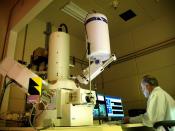Secrecy in Science
In November of 1996 an article in the Scientific American reported an increasing alarm in secrecy in scientific research. In W. Wayt Gibbs' article, he describes the negative consequences of withholding scientific research, how it is profitable to companies, and the migration of funding for schools.
In recent years many scientists have escalated the issue of increasing secrecy in scientific research and its negative consequences. As a whole withholding research leads to diversion of resources, bogging down progress, and in its entirety falsifies what science is based on. Steven A. Rosenberg, a surgeon the National Cancer Institution, instigates that delaying progress can be great threat in medicine. For example, if research is held back, it in turn slows down the development of treatments for diseases, and the consequence may lead to deaths of people needlessly.
Industry is now making an enormous profit as companies move towards biotechnology.
Scientists who make contracts with commercial industries delay publication, because they must submit their work. Companies then have two to four months to go through the data before it can be published. Most times contracts input that nothing can be published without their consent. By doing this companies can put new discoveries on hold until they can utilize the research therefore beating out competition and maximizing profit.
The federal government has cut funding to universities towards research, leaving companies to take the load. Investors put money in for the research, and they want to protect their assets, so restrictions must be implemented in the research being done. Industry backing has become so significant that Ronald Sederoff, from North Carolina State University, points out that without commercial backing research could not be possible.


